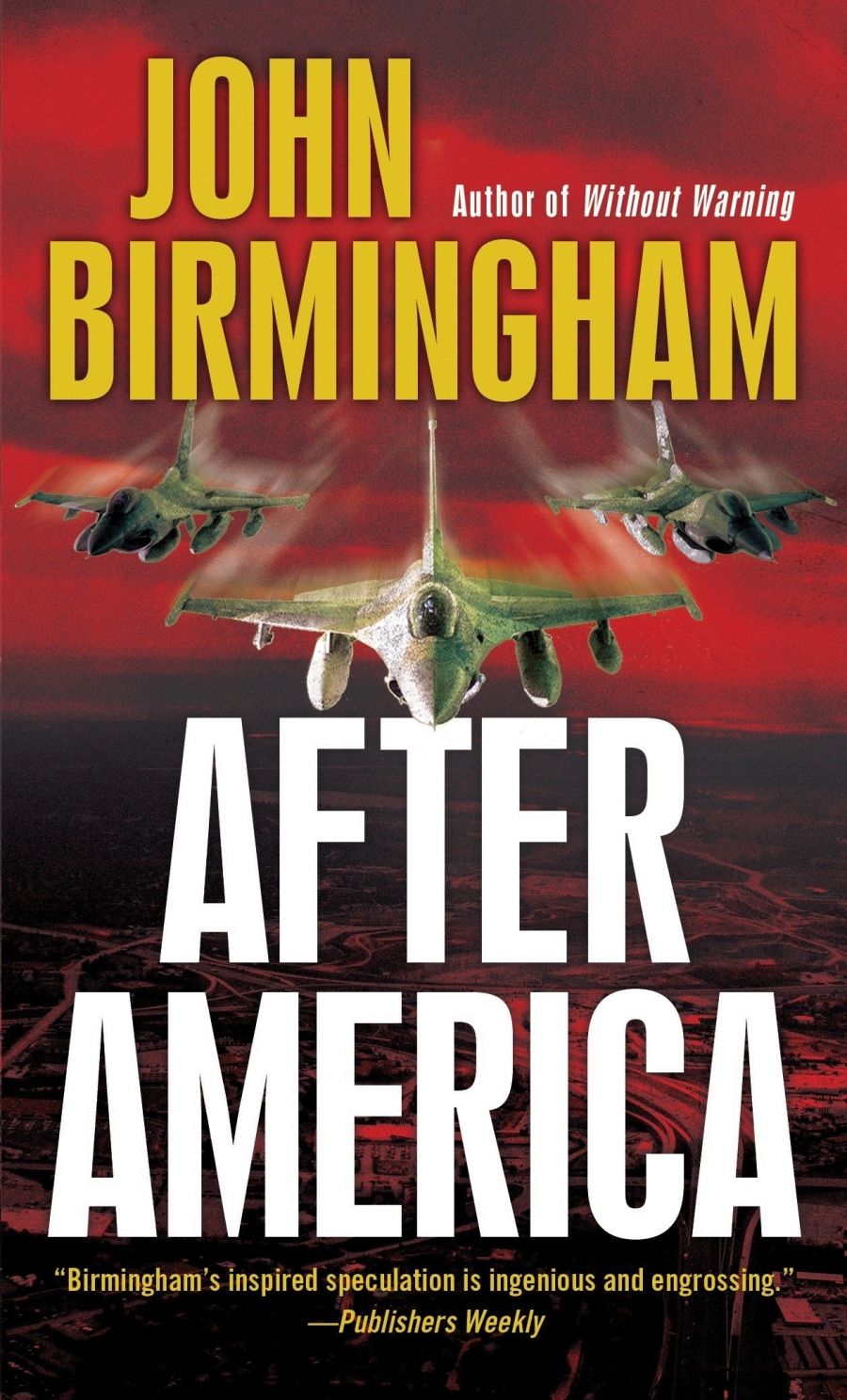
- Free Article: No
- Contents Category: Fiction
- Review Article: Yes
- Online Only: No
- Custom Highlight Text:
John Birmingham’s After America is the second book in what is clearly intended to be a trilogy of page-turners – a follow-up to his Axis of Time trilogy, the swashbuckling alternative history which saw a US carrier battle group transported back in time to the middle of World War II. After America, the sequel to Without Warning (2009), is set in a decidedly dystopian alternative present, the result of a mysterious energy wave that wipes out most of the human and animal life forms in North America in 2003. As one might expect, chaos ensues. A global ecological catastrophe has accompanied the human disappearance, a civil engineer from Seattle (the only big US city to survive the wave) has been elected president, Israel has launched nuclear strikes on its Middle East neighbours, and groups of well-organised pirates from Lagos have taken over New York City.
- Book 1 Title: After America
- Book 1 Biblio: Macmillan, $32.99 pb, 535 pp
This is an airport novel in the proudest traditions of the genre. Detailed descriptions of close combat jostle comfortably with the specifications of high-tech weaponry, tongue-in-cheek action clichés and an energetic multithreaded narrative that converges towards a thrilling climax. Yep, we’re talking Tom Clancy and Clive Cussler meets Stephen Cobb and Harry Turtledove, with enough gutsy clichés to impress (or perhaps shame) every other novelist who ever managed to emboss their name on the cover of an action-themed paperback.
None of which should detract from the brio with which Birmingham approaches his narrative. The author clearly enjoys his re-imaginings of international relations as much as he likes women who know how to wield advanced automatic weapons. There is plenty of both in this uneven but enjoyable romp through the outer reaches of Birmingham’s ‘cheeseburger gothic’. While it is disarmingly easy to consume, I also found the pulpy taste of well-turned professional blockbuster occasionally difficult to wash from my palate.
For the fans, however, this will be a rewarding experience. Several of our favourite characters from Without Warning are back, including Seattle engineer-turned-President James Kipper, and my favourite, Caitlyn Monroe, the tough-as-nails assassin with a heart of gold. While not exactly cardboard cut-outs, there is not a huge amount of depth and subtlety to Birmingham’s characterisations. True to the form of this genre, discussions of weapons often stand in for emotional development. On the other hand, Birmingham’s trademark laconic wit often lends the internal monologues a surprising degree of humour. He is clever enough to keep his plot taut: the pace is unflagging, even if the prose is sometimes risible.
It is interesting to contrast Birmingham’s early work with his increasingly industrial later output. After making a name as a talented non-fiction feature writer and long-form journalist, Birmingham broke through with He Died With a Felafel in His Hand (1994), an hilarious and viciously accurate chronicle of his time as a share-house dropout. Felafel became something of a cult favourite, perhaps because Birmingham conveyed the voice of household poverty among Generation X-ers. Birmingham’s follow-up was The Tasmanian Babes Fiasco (1997), another Brisbane share-house book, but one that was less successful.
It is as a non-fiction writer that Birmingham has critically impressed. His Quarterly Essay on East Timor, Appeasing Jakarta: Australia’s Complicity in the East Timor Tragedy (2001), which drew on his previous expertise as a defence analyst in Canberra, is a work of genuine scholarship and original research. His history of Sydney, Leviathan: The Unauthorised Biography of Sydney (1999), is almost Hobbesian in its scepticism of humanity, and features Birmingham’s undoubted talent for the wry and the vernacular. Leviathan features one of Birmingham’s strongest abilities: his sharp grasp of journalistic illustration, at play when Birmingham swaps the writer’s den for the streets and back-alleyways. In contrast, Dopeland: Taking the High Road Through Australia’s Marijuana Culture (2003) is an anecdotally rich but insubstantial stumble through our marijuana culture.
But it is Birmingham’s airport novels which now constitute the core of his authorial output, and must therefore be the basis for any mature appraisal of this complex and interesting writer. In one respect, Birmingham’s interest in speculative eschatology hints at a broader discussion of late modernity, much like Mike Davis’s exploration in The Ecology of Fear: Los Angeles and the Imagination of Disaster (1998). But the populist turn in Birmingham’s fiction is also telling commentary on the conditions of the publishing industries and what’s required to make a living in them. This is Birmingham as the professional writer: the perpetual freelancer who has turned his diverse interests and considerable talents to the production of narrative in its most currently remunerative market.
In reviewing this book, I decided to read After America in its natural environment: at Sydney and Melbourne airports. It is not for nothing that the military thriller is so indelibly associated with this particular type of public building. Architecturally, airports suggest a rich vein of experiences, from the thrill of life-changing holidays to the ennui of ‘sky warrior’ professional travel. Airports are also a key site of what Anthony Vidler calls the ‘architectural uncanny’ – a kind of ‘unhomely’ public space in which tacky commerce, state regulation and human displacement rub against one another in the day-glo of fluorescent lighting. With its strange mix of alternative reality, ecological holocaust, and paramilitary soft porn, After America is a rewarding overnight bag companion.


Comments powered by CComment